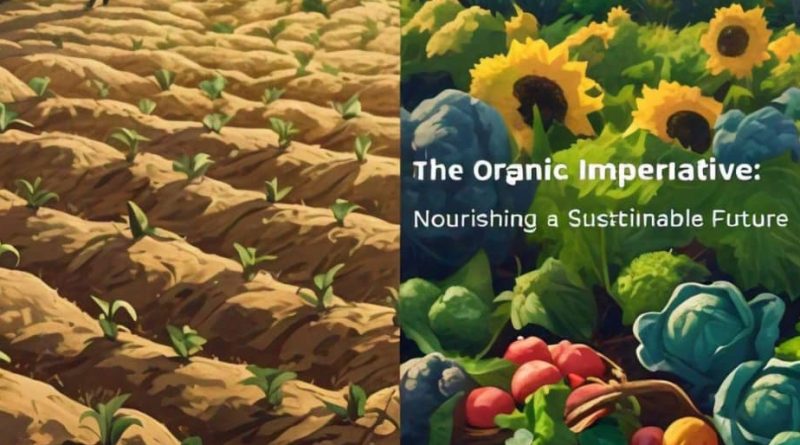THE ORGANIC IMPERATIVE: How Neglecting Sustainable Farming Practices Threatens Food Security and Public Health
By Dr. Iyke Ezeugo
Nigeria’s agricultural sector, once a robust pillar of the economy, now teeters on the brink of collapse. Despite some impressive activities, supply still lags demand. A combination of skyrocketing food costs, waning agricultural productivity, ineffective government investment management, and shortsighted federal interventions – such as impulsive subsidies, bans, and import duty exemptions – has cast a pall of uncertainty over the country. This crisis serves as a stark reminder of the consequences of neglecting sustainable farming practices.
For too long, we have prioritized quick fixes and short-term gains over meaningful solutions and long-term sustainability. The result is a fragile food system vulnerable to foreign supply manipulations, unpredictable quality, economic shocks, climate change, fraud, and pests. This unsustainable trajectory not only threatens our food security but also poses serious risks to public health.
It is imperative that we shift our focus towards sustainable farming practices, with a particular emphasis on organic agriculture. By adopting eco-friendly methods, we can restore soil health, reduce our reliance on harmful chemicals, and build a more resilient food system. This move could also help the nation optimize its heavily flawed fertilizer procurement and distribution system, stemming the waste of billions of naira and redirecting these funds towards more effective farming support initiatives. The time for action is now; we must work towards a future where our agricultural sector is thriving, sustainable, and capable of meeting the nation’s food needs.
Are there some Philosophical Foundations and Historical Lessons?
The wisdom of sustainable farming is not new. The ancient Romans, in their quest for a stable food supply, practiced crop rotation and organic manure usage. Similarly, the Indian philosopher and agriculturalist Masanobu Fukuoka espoused the principles of “do-nothing farming,” emphasizing minimal intervention and natural processes. In Nigeria, the traditional farming practices of crop rotation, intercropping, and organic fertilization have been sidelined in favor of chemical-dependent agriculture. This shift mirrors the historical negligence seen in other sectors, most notably in the petroleum industry.
The Petroleum Parallel: A Cautionary Tale for Food Importation
The government’s decision to open borders for food importation and provide subsidies may seem like a quick fix, but it has alarming long-term implications. Our experience with importing refined petroleum products serves as a warning:
– Initially, local refineries met domestic needs, but cabals profited more from importation, undermining local production.
– This led to dependence on imports, job exportation, and a debilitating subsidy regime draining national resources.
Similarly, Nigeria’s reliance on imported food has potentials for creating these scenarios:
– Neglecting sustainable farming practices jeopardizes self sufficiency, food security, safety, and public health.
– Importation, initially an ad-hoc measure, risks becoming entrenched, driven by interests profiting from the status quo.
It’s crucial to use strategic investments in sustainable farming practices to address the root cause of unaffordable food prices due to inflation and consider the consequences of this decision to avoid repeating the mistakes of the petroleum industry.
Consequences of Neglect
Again, the consequences of neglecting sustainable farming practices are dire. Food security is threatened when reliance on imported food exposes the nation to global supply chain disruptions, price volatility, and quality control issues. Public health is compromised when imported food carries risks of contamination and lacks the freshness and nutritional value of locally grown produce. Socioeconomic stability is undermined as local farmers lose their livelihoods, leading to increased poverty and migration from rural areas.
The story of Ireland’s Great Famine in the 1840s serves as a grim reminder. The over-reliance on a single crop (the potato) and neglect of sustainable agricultural diversity led to mass starvation when the potato blight struck. In modern times, countries like Venezuela have faced food shortages *due to economic mismanagement and neglect of local agriculture,* resulting in widespread hunger and social unrest.
The Path Forward: Embracing the Organic Imperative
To avoid a similar fate, Nigeria must embrace the Organic Imperative. This requires a strategic and interventionist approach from the government and a cultural shift among the people. Key actions include:
1. Investing in Organic Farming: Providing research funding, subsidies and technical support for farmers to adopt organic practices, such as composting, crop rotation, and biological pest control.
2. Educational Campaigns: Raising awareness about the benefits of organic food for health and the environment through schools, media, and community programs.
3. Strengthening Local Supply Chains: Developing infrastructure to support local markets, ensuring that organic produce can reach consumers efficiently and affordably.
4. Policy Reforms: Implementing policies that discourage chemical-intensive farming and promote organic certification standards to ensure quality and trust in locally produced food, and export opportunities.
5. Research and Development: Investing in research to improve organic farming techniques and develop resilient crop varieties suited to Nigeria’s diverse agro-ecological zones. With rightly harnessed research efforts focused on Organic Agriculture, solutions to the known challenges will not be impossible.
The Global Context: Lessons from Other Nations
Globally, the shift towards organic agriculture has yielded significant benefits. In Cuba, the collapse of the Soviet Union in the 1990s forced the nation to adopt organic farming practices due to a sudden loss of chemical inputs. This transition not only helped Cuba achieve food security but also improved the health of its population. Similarly, Bhutan has committed to becoming the world’s first 100% organic nation, recognizing the long-term benefits for its environment and citizens’ well-being.
In contrast, countries that have heavily relied on industrial agriculture have faced severe consequences. In India, the Green Revolution initially boosted crop yields through chemical fertilizers and pesticides. However, *over time, it led to soil degradation, water scarcity, and health problems among farmers and consumers* due to pesticide exposure. The lessons from India underscore the importance of sustainable practices that preserve environmental health and ensure long-term productivity.
Economic and Environmental Benefits
Embracing organic agriculture in Nigeria could revitalize rural economies. By investing in local farms, we can create jobs, stimulate economic growth, and reduce poverty. Organic farming methods often require more labor than conventional practices, providing employment opportunities in rural areas where job prospects are limited. Additionally, by reducing dependency on imported food, Nigeria can save foreign exchange and reinvest those savings into the local economy.
Environmental benefits are equally significant. Organic farming practices enhance soil fertility, reduce erosion, and improve water quality. They also promote biodiversity by encouraging a variety of crops and natural pest control methods. This contrasts sharply with the monoculture practices and chemical dependencies of conventional farming, which deplete soil nutrients and harm ecosystems.
Public Health Implications
The public health implications of organic agriculture are profound. Studies have shown that organic foods contain higher levels of antioxidants and essential nutrients in their natural state compared to conventionally grown produce. *By reducing exposure to pesticides and synthetic fertilizers, organic farming can lower the risk of chronic diseases such as cancer, respiratory problems, and neurological disorders.* Ensuring that Nigerians have access to safe, nutritious food is not just an agricultural issue; it is a fundamental public health priority.
Overall, neglecting sustainable farming practices is not merely an agricultural issue; it is a threat to national security, public health, and economic stability. By drawing lessons from history and heeding the philosophical wisdom of sustainable stewardship, Nigeria can chart a course towards a resilient and self-sufficient future. The Organic Imperative is clear: we must act now to safeguard our food, our health, and our nation’s prosperity. The time to embrace sustainable agriculture is now, before the cost of neglect becomes too high to bear.
Nigeria’s food crisis is rooted in inflation, corruption, and misguided policies, rather than just a shortage. While importing and subsidizing food may offer temporary relief, it poses long-term risks:
– Dependence on imports, making the nation vulnerable to global supply chain disruptions
– Compromised public health due to contaminated and less nutritious imported food
– Economic hardships for rural communities as local farmers lose their livelihoods
– Increased poverty and rural-to-urban migration
It’s crucial to address these underlying issues to ensure a sustainable food future for Nigeria.
Dr. Iyke Ezeugo, the author, is a researcher and satirist who uses his parody to provide profound insights on public affairs, sparking meaningful conversations and debates. Through his works, he challenges the status quo, promotes critical thinking, and inspires fresh perspectives on contemporary issues.




